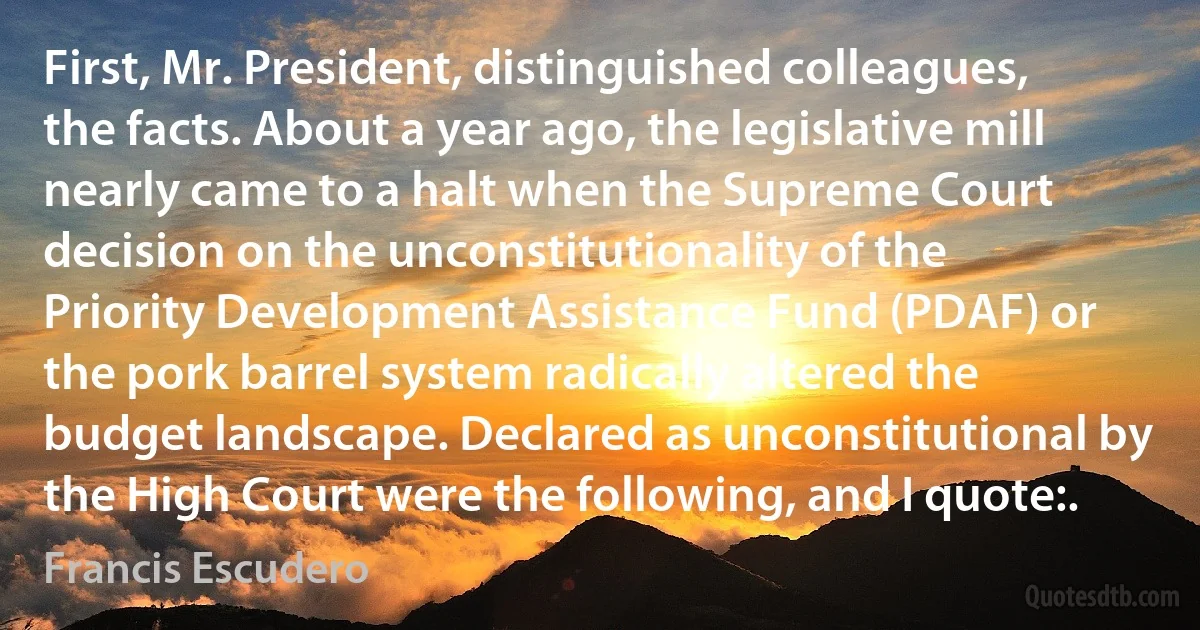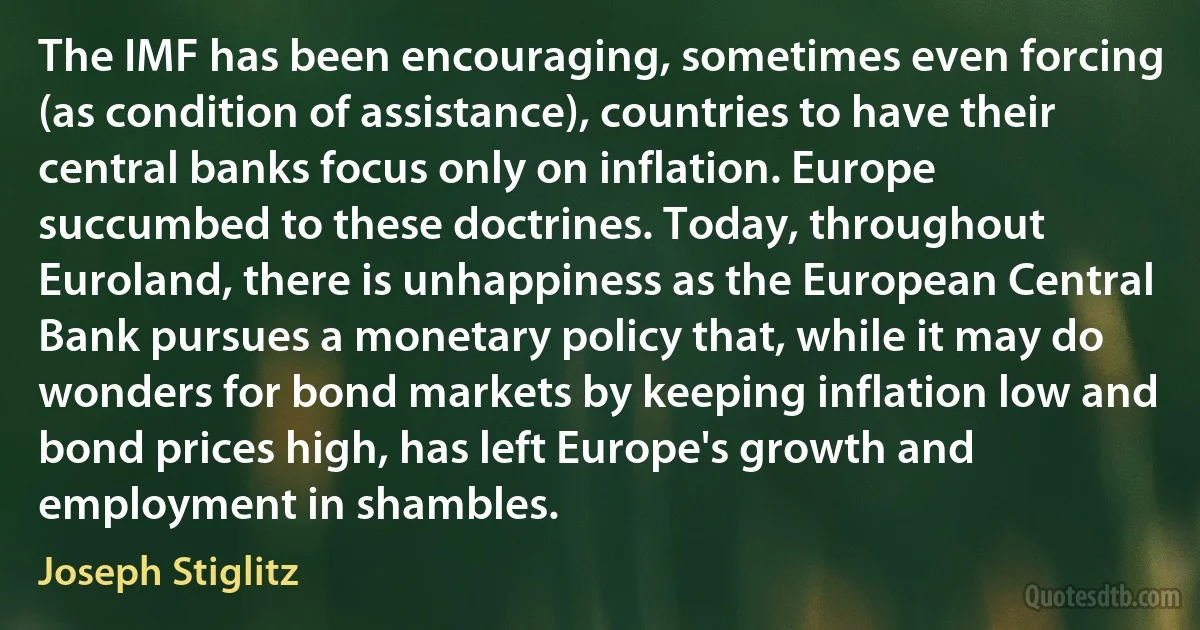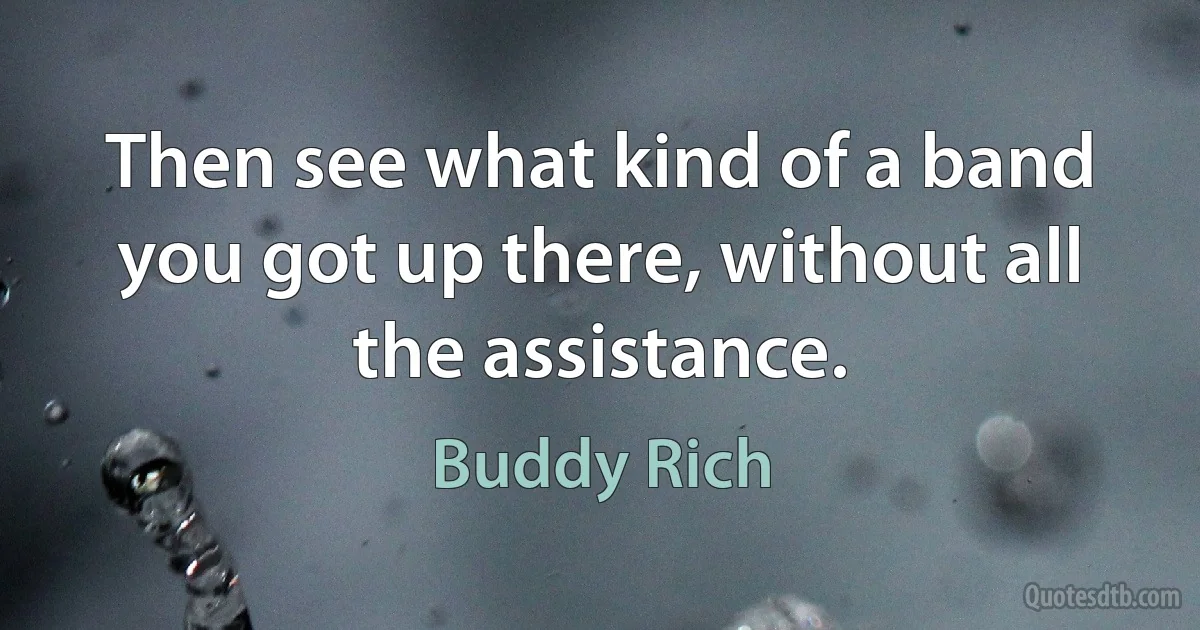Assistance Quotes - page 13
Lastly, we have also added the proviso in Section 3 on the Use and Release of Funds, that a uniform formula or parameter be developed for the fair and equitable distribution of Emergency Shelter Assistance funds across typhoon-affected barangays, municipalities, or provinces nationwide.

Francis Escudero
The Senate version of the 2015 National Budget will define savings in FULL COMPLIANCE WITH THE SUPREME COURT DECISION on the Priority Development Assistance Fund (PDAF) and the Disbursement Acceleration Program (DAP). Our committee accepted all of Senator Miriam Defensor Santiago's points and took note of her concerns. I believe Senator Santiago based her speech on the NEP version, NOT the one the Senate has amended. However, the Senate version is never going to adopt the version of the NEP as regard to their definition of savings.

Francis Escudero
In the absence of significant, substantiated findings regarding new, uncorrected violations, the Department of Defense decided to suspend the university from participating in the Tuition Assistance Program based on document requests by two government agencies that are not, in fact, the Department of Defense and does not indicate a violation or admittance of guilt. We call on our service men and women to serve and protect our interests, often at great cost to themselves and their families. Yet the Senator from Illinois suggests that they are not capable of choosing their own path when determining their postsecondary educational needs. By the way, on a technical violation of the budget agreement, the Senator from Illinois was one of the leaders in voting against the Defense authorization bill, which was the result of many years of work.

John McCain
[N]o consideration in life shall make me stoop to Opposition. I am still ready to accept any part of them that will come to the assistance of my present efficient Ministers; but whilst any ten men in the kingdom will stand by me, I will not give myself up into bondage. My dear Lord, I will rather risk my crown than do what I think personally disgraceful; and whilst I have no wish but for the good and prosperity of my country, it is impossible that the nation shall not stand by me; if they will not, they shall have another king, for I will never put my hand to what would make me miserable to the last hour of my life.

George III of the United Kingdom
I own I expect great efforts from this force, and shall not be satisfied if persons count what number of ships are brought against us. It was the vigour of mind shown by Queen Elizabeth and her subjects, added to the assistance of Divine Providence, that saved this island when attacked by the Spaniards. It is necessary to be active on the present occasion, and to bring the enemy as soon as possible to decisive action.

George III of the United Kingdom
I don't need them to tell me what it feels like to be poor ... I already know how this feels, how it smells and how it tastes! When I talk to them ... I want them to tell me about their hopes and aspirations, about their dreams... about the road ahead and how they imagine it will shape up out in front of them to make the dreaming and hoping come true. I ask them about assistance, about the health, and about their families near or far.

Manuel Rivera-Ortiz
Hayek died in Freiburg, Germany, on March 23, 1992, less than two months shy of his ninety-third birthday. After 1985, he was unable to work and lost contact with almost all friends and associates. In his last years, almost the only people with whom he had regular contact were his wife, Helene; secretary Charlotte Cubitt, whom he always called "Mrs. Cubitt”; children Larry and Christine Hayek; and Bartley. Hayek was grateful to Cubitt for her assistance from 1977 to 1992. He inscribed in her copy of The Fatal Conceit in 1990: "In gratitude for all her help over so many years F. A. Hayek.”
During his last years, he had periods of more and less lucidity, as well as being ill and depressed. Lord Harris of the Institute of Economic Affairs wrote in his obituary of Hayek that "by 1989 the great man had lost touch with affairs.” He was buried in Vienna, the place of his birth.
[...] Friedrich Hayek was the greatest political philosopher of liberty during the twentieth century.

Alan O. Ebenstein
It would be an error... to suppose that science makes the artist; yet it lends to him the most powerful assistance. In general, it is difficult to keep it within due limits; and I shall even freely admit that Albert Durer, in his work upon the proportions of the human frame, has imparted to it a certain scientific dryness, which lessens its utility. One finds there more of the geometer than the artist, and the geometer, moreover, such as he was at a time when it had not yet been discovered how much the rules of style enhance the value of scientific works, and, above all, of those which appertain at the same time to the domain of the fine arts.

Adolphe Quetelet
He was extremely well versed in mechanics, and in the principles and theory of construction, and took the greatest interest in large engineering works. This led to much communication with Stephenson, Brunel, and other Engineers, who consulted him freely on the... great works on which they were engaged: in particular he rendered much assistance in connection with the construction of the Britannia Bridge over the Menai Straits.

George Biddell Airy
It is not then from the alienated affections of Ireland or America, that you [George III] can reasonably look for assistance; still less from the people of England, who are actually contending for their rights, and in this great question, are parties against you. You are not however, destitute of every appearance of support: you have all the Jacobites, Non-jurors, Roman Catholics, and Tories of this country, and all Scotland, without exception. Considering from what family you are descended, the choice of your friends has been singularly directed; and truly, Sir, if you had not lost the Whig interest of England, I should admire your dexterity in turning the hearts of your enemies.

Junius
I know you are brave and unselfish people, making sacrifices for a great principle but I cannot join you. I believe in the present effort which the allies are making to suppress German militarism. I would approve of America going to their assistance. I would enlist to that end, if ever there be a situation where I believe I could do more with my hands than I could with my pen.

Upton Sinclair
And therein lies the reason why motor industry people don't fawn on journalists. They're in the hot seat, deciding who gets to drive what and who gets to go where. Why should they grovel when they know that without their assistance the motoring journalist is up the creek without a boat, nevermind a paddle?

Jeremy Clarkson
After I finish my term as president, I want to be a happy volunteer. As I have said before, our democratic reform is still ongoing and it must continue to be consolidated and deepened. But there is still a lot we could do regarding strengthening Taiwan-centric consciousness as well as realizing social equity and justice. I think I could be of assistance in this regard. Apart from being a happy volunteer, I also wish to make some contribution as a pusher and a cultivator and a gardener on Taiwan's road to democracy.

Chen Shui-bian
A year ago we had undertaken no specific commitments on the Continent of Europe, beyond those which had then existed. ... To-day we are bound by new agreements for mutual defence with Poland and Turkey; we have guaranteed assistance to Greece and Rumania against aggression. ... We know that, if the security and independence of other countries are to disappear, our own security and our own independence will be gravely threatened. We know that if international law and order is to be preserved, we must be prepared to fight in its defence.

Edward Wood
[O]ne or two others, and certainly the Australians, require a good deal of education. They must realise that, if we denounce the Japanese Alliance, we can no longer rely on the assistance of the Japanese Fleet, and we must prepare for the possibility that Japan may enter into arrangements which may bring her into hostility with us. This would mean maintaining on the China Station a Fleet superior not only to the Japanese Fleet, but also to any probable combination of the Japanese Fleet with any other Fleet in those waters. This would, of course, be in addition to maintaining the two-Power standard in European waters, both in home waters and in the Mediterranean. The logical conclusion of denouncing the Japanese Alliance would be that Australia and New Zealand should undertake the burden of naval supremacy in China seas. This they are neither willing nor able to do.

Edward Grey, 1st Viscount Grey of Fallodon
While Senate Majority Leader Mitch McConnell refused to reconsider immigration reform in the 2015 session, he did find time to debate a proposal by Pennsylvania's Republican senator Pat Toomey to deny federal economic development assistance to "sanctuary cities," where police and other public agencies do not inquire into a person's immigration status during routine business.

Mitch McConnell
By the help of God and with His precious assistance, I say that Algebra is a scientific art. The objects with which it deals are absolute numbers and measurable quantities which, though themselves unknown, are related to "things" which are known, whereby the determination of the unknown quantities is possible. Such a thing is either a quantity or a unique relation, which is only determined by careful examination. What one searches for in the algebraic art are the relations which lead from the known to the unknown, to discover which is the object of Algebra as stated above. The perfection of this art consists in knowledge of the scientific method by which one determines numerical and geometric unknowns.

Omar Khayyám



